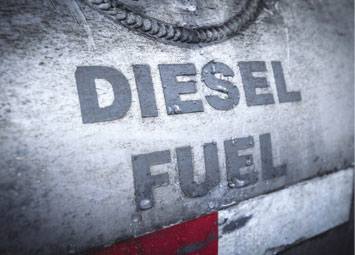Mark Griffiths, Head of Business Development at Adler and Allan, discusses the importance of evaluating your assets in preparation for upcoming legislative reform to red diesel.
In the 2020 budget, the government announced that many sectors will lose their entitlement to use red diesel from April 2022. The reforms support the UK’s bold environmental commitments to improve air quality, champion greener fuels, and achieve net zero carbon emissions by 2050.
Facilities management businesses who use red diesel for vital back-up power generation – while saving 80 per cent, per litre on duty rates – must now make plans to replace existing reserves with alternative fuel options, such as white diesel, HVO (a 100 per cent renewable ‘drop in’ diesel substitute), or even BioDiesel.
COMPLIANCE CROSSROADS FOR THE FM SECTOR
Without question, the mandatory changes, resultant tax increase, and relatively short two-year implementation window will place significant pressure on already stretched facilities management budgets. And in a sector where business continuity is king, the far-reaching revisions leave no margin for error. So how can FM providers balance environmental responsibility with rising costs and the risk of operational downtime?
The answer lies in a long-term view and recognition that revamped red diesel rules are more than a standalone fuel supply swap. They are a move towards ecological accountability. Under ambitious government climate change targets, protective measures across air and water quality, biodiversity, natural resources, and waste management will continue to be enshrined in law.
The updated regulations are a turning point for businesses, encouraging not only a hands-on review of current assets, but also a high-level rethink of ongoing efficiency and green credentials. Working with an experienced environmental consultant will help you tackle the immediate task of red diesel replacement – and navigate your organisation’s most productive and cost-effective route to lasting compliance.
Enlisting expert support to shape your ideal strategy, investment, and timeline will allow you to manage the demands of eco-conscious working practices.
DETERMINING YOUR GREEN OBJECTIVES
The replacement of red diesel involves a specialised sequence of tank cleaning, line flushing, and the uplift of current stores to make way for onward fuel. For FM providers, relied upon for round-the-clock delivery of customer support services, the success of the procedure – depends on a detailed understanding of your operations, assets, and risk profile.
As well as carrying out the complex fuel transfer process, a qualified consultant can deliver a comprehensive portfolio survey to ensure your infrastructure is fit for purpose going forward. A full estate inspection will identify structural and functional weaknesses – linked to age, internal corrosion, and exposure to the elements – that could lead to service failures, pollution events, and punitive fines under increasingly tough environmental laws. A trusted partner will also discuss how improvements to your fuel management and maintenance programme could unlock long-range cost savings and efficiencies.
As a first step, an environmental professional will undertake a practical audit of assets to gauge their condition, potential ecological hazards, and the recommended plan for fuel uplift and fulfilment. To ensure unfaltering operational continuity, fuel replenishment for back-up generators is likely to require a completely bespoke, phased methodology.
Following open dialogue and mutual agreement of your most beneficial approach, skilled onsite technicians – trained in the use of all fuel transfer pumps, handling hazardous materials, and spill response procedures – will implement diversion systems and temporary fuel supplies to prevent downtime and disruption.
Additional services will include full tank inspections to identify signs of degradation, comprehensive cleaning, and removal of red diesel dyes to prevent penalties under new laws. Once tanks are degassed and clear of residue, legacy fuel will be removed and disposed of in line with current compliance guidelines.
Tailored follow-up consultation will focus on top line business aims and your organisation’s long-term environmental risk reduction strategy, with every element designed to prolong the life of your assets and protect your company, clients, and the wider community.
THE RIGHT ACTIONS, AT THE RIGHT TIME
Following a government consultation ending in October 2020, the finer details of red diesel reforms are yet to be revealed, but prudent operators will take immediate – yet measured – action. By initiating the planning process now, and aligning with a commercially minded environmental specialist, it is possible to intelligently spread investment and mitigate the financial burden of building a greener business. A professional consultant will help you pinpoint and prioritise your most critical environmental risks, while – crucially – setting timescales for less urgent requirements, allowing you to make meaningful changes at a manageable pace.
In the HM Treasury consultation document presenting amended tax treatments of red diesel and other rebated fuels, the government shares its vision to ‘provide businesses with a much stronger incentive to improve the energy efficiency of their vehicles and machinery, look for more environmentally friendly alternatives, or just use
less fuel’.
It also describes the updates as ‘a signal to manufacturers to design and sell new alternatives’, thereby creating a more competitive market and consequently bringing down the price of these ‘alternatives’. While companies wait for green fuel costs to fall, they should begin transforming operations one compliant step at a time.
 Readying your sites for the red diesel switch and developing a deeper understanding of its environmental risks and opportunities are sensible places to start. Working with a single, proven supplier who can guide you through the entire process – from discovery to delivery – will ensure you remain compliant, provide solid support to your customers, and meet evolving expectations around environmental responsibility.
Readying your sites for the red diesel switch and developing a deeper understanding of its environmental risks and opportunities are sensible places to start. Working with a single, proven supplier who can guide you through the entire process – from discovery to delivery – will ensure you remain compliant, provide solid support to your customers, and meet evolving expectations around environmental responsibility.





